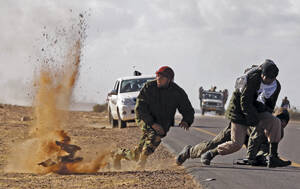Calls for the creation of a no-fly zone over Libya grew louder in the United States as civilians came under fire from forces loyal to the Libyan leader, Col. Muammar el-Qaddafi, and opposition forces suffered a number of battlefield setbacks. Over the course of a handful of brutal days in early March, pro-Qaddafi forces reclaimed communities and much of an oil facility that had been under control of Qaddafi’s lightly armed resistance.
The poorly organized opposition force, which first emerged as a peaceful protest against Qaddafi’s strong-arm rule in mid-February, came under heavy fire from tanks, helicopters and jet fighters that halted a somewhat chaotic advance toward the capital, Tripoli. Unarmed protesters against Qaddafi rule in Tripoli were met with automatic weapons, and noncombatants have been in harm’s way at other sites of conflict because of the indiscriminate use of force by Qaddafi loyalists. Congressional leaders, including Senator John McCain of Arizona, a Republican, and Senator John Kerry of Massachusetts, the Democrat who is chairman of the Senate Foreign Relations Committee, have urged stronger measures from the Obama administration.
But any unilateral U.S. action would be a mistake, said Emad Shahin, the Henry R. Luce Associate Professor of Religion, Conflict and Peacebuilding at the Kroc Institute for International Peace Studies at the University of Notre Dame. “The United States has two presences in the region that are already viewed by many as a kind of occupation,” Shahin said. “Any kind of conspicuous or heavy U.S. presence in this conflict is not good for the [opposition] and it’s not good for the United States,” which should first seek the endorsement of the African Union or the Arab League.
“I think that the Libyans need protection from the strikes being launched against them,” Shahin said. But without regional support, a U.S. move against Qaddafi would delegitimize the resistance movement, Shahin said, and would play directly into Qaddafi’s narrative of external forces manipulating the opposition. A unilateral gesture would also further weaken the U.S. position in the Middle East, he said, where “the United States does not want to get entangled” in another conflict.
While it works toward a potential no-fly zone “in cooperation with other states,” Shahin said, the United States should aggressively continue diplomatic efforts to press the Qaddafi regime, including possible recognition of the resistance forces as the legitimate government of Libya. The United States could also do more to respond to the refugee crisis emerging from the conflict. “I think this is as far as they can go,” Shahin said.
In Tripoli on March 4 a degree of calm appeared to have been restored through fear, as residents ceased conducting protests against the regime after they had been repeatedly met by lethal force. Bishop Giovanni Innocenzo Martinelli, the apostolic vicar of Tripoli, Libya, said: “The situation is very uncertain, and for the moment anything is possible. In my view, the international embargo and threats will be unlikely to convince the Libyan authorities to surrender.
“I believe that we can find another way out of this situation,” Bishop Martinelli said. “And it is not difficult to find one because in the Bedouin culture there are social structures that assist reconciliation. There may be people that would favor a turn in negotiating. In my humble opinion, it is the only way to surpass the crisis and prevent more bloodshed. There are better ways than with violence.”
Meanwhile, a Caritas Internationalis team was at work on the Egypt-Libya border in Salloum, where thousands of foreign workers fleeing the violence had been stranded. Around 5,000 more were arriving daily.








